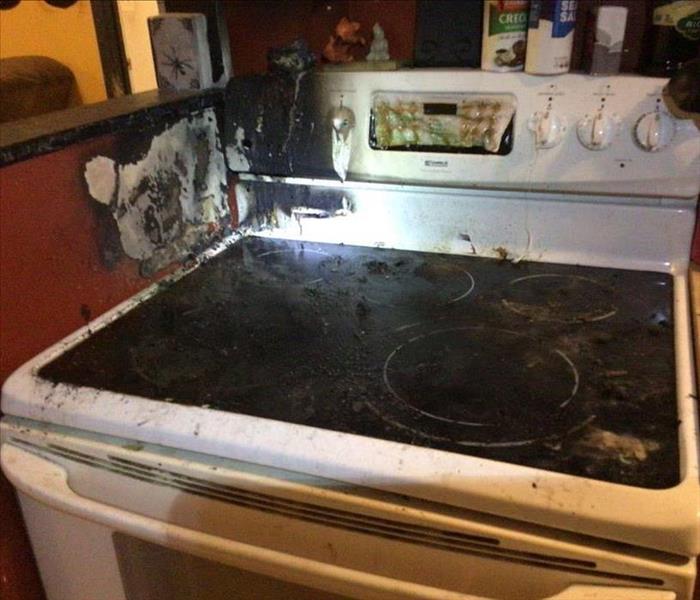How To Prevent Fires While Cooking
10/6/2021 (Permalink)
 Cooking is the number one cause of house fires. Unsafe cooking can cause fire damage, which is what happened to this kitchen.
Cooking is the number one cause of house fires. Unsafe cooking can cause fire damage, which is what happened to this kitchen.
As Fire Prevention Week comes to an end, SERVPRO of South Fleming Island/ North Bradford County wants to remind you to stay safe while cooking, which is the number one cause of house fires. Cooking fires can happen to anyone, but there are ways to avoid them that you can make part of your everyday cooking practices.
First off, you should never leave the cooktop unattended while cooking - no matter what. If you must leave, either turn the stove top off or find someone to watch over the cooktop in your absence.
As far as clothing goes, short, close-fitting, or rolled sleeves are best so that your clothes are out of the way and don’t catch anything that could potentially burn the fabric and start a fire.
It is also extremely important to have an extinguisher nearby in case of any emergencies so that you can try to put the fire out. Remember to call 911 first for help because you never know how fast a fire can grow and get out of hand. The faster the response the better.
Another tip that may not come to mind right away is to not store anything in your oven. It may seem like a convenient place to store things, like a meal you want out of the way, a desert, or maybe even cook books, but this is a terrible idea. These items are easily forgotten and when the oven is turned on again and preheating, these items can catch on fire. It is much better to be safe than sorry.
It is important that your cooking areas are kept clean of flammable materials like splattered grease, food wrappers, or oven mitts. When these items are in unpredictable and inconsistent places, they may end up too close to a burner and catch on fire. A cookbook may be placed on a burner that you thought was off or had cooled down but hadn’t and start a fire. Whether you believe the stovetop is on or off, it is good practice to not use it as a resting place for anything.
Treat fires appropriately. This means that it is important to know what content is burning. If it is food burning, water is sufficient to put it out. However, if it is grease that is burning, water may only turn to steam and become a hazard. For that reason, grease fires should be smothered with a lid, not treated with water. Microwave fires should be responded to by turning the microwave off and waiting for the flames to die out completely. Opening the microwave door will only allow more oxygen to fuel the flame.






 24/7 Emergency Service
24/7 Emergency Service